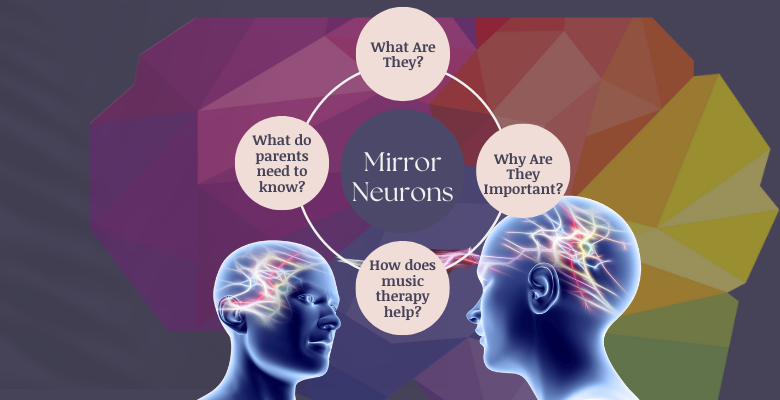An Overview of Mirror Neurons in Therapy
Mirror neurons are a fascinating topic that has gained recognition in psychology. They are an essential part of understanding human behavior and how we interact with one another. In this article, we will discuss the following:
- The definition of mirror neurons
- Why mirror neurons are important
- How they affect our relationships
- Mirror neurons and Music Therapy
- How can mirror neurons help parents
What are mirror neurons?
Mirror neurons were first discovered in 1992 by Giacomo Rizzolatti and his team at the University of Parma in Italy. Since then, they have been studied extensively in both humans and primates alike. There is now evidence to suggest that these cells play a significant role in our ability to empathize with others and learn through imitation. In other words, we can use them to experience emotion vicariously through someone else’s actions or feelings.
Mirror neurons are a type of neuron that fires both when an action is performed and when the same action is observed. This suggests that these neurons help us learn by observing how others do something or imitating their behavior. For example, a child may observe their parent playing the guitar and then imitate what they saw. The mirror neurons fire when the parent plays the guitar and when the child copies what they saw.
Why Are They Important?
Mirror neurons play an important role in learning, empathy, understanding, and social interaction. By allowing us to imitate others, mirror neurons facilitate learning by observation. This can help us learn faster since it does not require trial-and-error learning methods like reinforcement learning or supervised learning. Additionally, mirror neurons allow us to experience empathy which can result in greater compassion for others and better relationships with them. Finally, understanding another person’s actions through mirroring can help improve communication skills and overall social interactions with one another.
Mirror neurons are an incredibly powerful phenomenon that can help us understand each other better than ever before–and even help us improve our relationships! These cells fire both when we perform an action ourselves or when we observe another person performing the same action; this enables us to empathize more deeply with those around us and learn through imitation rather than first-hand experience. Mirror neurons are an important part of human behavior that allows us to learn from others through observation and imitation while fostering empathy and understanding between individuals.
How Do Mirror Neurons Affect Our Relationships?
The presence of mirror neurons has far-reaching implications for our relationships with others. For example, research suggests that these cells can help us develop empathy towards others by allowing us to put ourselves in someone else’s shoes and better understand their feelings and experiences. Additionally, mirror neurons may also influence how well we cooperate and collaborate with others by allowing us to interpret their behaviors and take appropriate action accordingly quickly. Finally, these cells can also help us develop trust between partners by promoting mutual understanding and creating a bond between two people through shared experiences.
Mirror Neurons and Music Therapy?
Music therapy effectively utilizes our natural ability to connect with others through the mirror neuron system. Mirror neurons respond when we observe another person’s emotions and actions. This allows us to empathize more easily with their feelings and understand what they are going through.
The use of music in a therapeutic setting can be particularly beneficial due to its neurological connection to our emotions. Listening to certain songs or melodies can have a calming effect, allowing us to connect with those around us on an emotional level. This connection acts as a bridge for psychological understanding between both therapist and patient, leading to better communication and greater trust.
In addition, music therapy also relies heavily on imitation — replicating the rhythm, melody, and vocal tones heard in songs — which helps stimulate our mirror neuron network and forge deeper connections. Playing instruments like drums or guitar can help synchronize our movements with someone else’s and create a shared emotional experience that goes beyond words.
Overall, utilizing the power of music within a therapeutic setting helps tap into our natural ability to empathize with others by activating the mirror neuron system. Through this connection, we can bridge any gap between patient and therapist to foster better understanding and trust-building!
How Can Mirror Neurons Help Parents?
Parents may often feel challenged when it comes to understanding how their children learn and process information. The concept of mirror neurons can be helpful in this regard, as they are brain cells that help us understand what other people are experiencing simply by observing them. Mirror neurons allow us to experience something similar to what we are seeing or hearing. For example, when you see someone else smile, your brain activates the same facial muscles you use to smile. Thus, there is a connection between the action of another person and our own brains’ response or reaction. This phenomenon is known as “mirroring” or “imitation learning”. Understanding mirror neurons can be especially helpful for parents because it explains why children absorb information so quickly from observing others around them. It also serves as a reminder for parents that their behavior impacts their child’s understanding of the world. As children often emulate the habits and behaviors of those closest to them, it’s important for parents to model positive behavior and language towards others to create an environment that helps foster healthy imitation learning in their child. In addition, mirror neurons provide insight into how emotions can be contagious; if we observe someone experiencing strong emotion (especially joy!), we can often find ourselves feeling similarly even without having experienced the situation firsthand! Therefore, parents need to create a loving and supportive home environment so their children can develop empathy and healthy social skills. Understanding mirror neurons can help inform this practice
Understanding mirror neurons can be an excellent tool for parents as they nurture and raise their children. Mirror neurons are a type of brain cell that helps us connect to others, mainly through shared emotions. When an individual’s mirror neurons are activated, they experience an internal version of another person’s emotional state by sensing it within themselves.
Being able to empathize with your child is essential in parenting, and understanding mirror neurons give you insight into your child’s feelings. Knowing that your child can physically feel the same emotions you do may help you understand them better when they become overwhelmed or frustrated.
On the flip side, understanding mirror neurons also enable parents to be aware of their own responses since these will be mirrored back to their children. Keeping calm and taking deep breaths when dealing with difficult situations can demonstrate effective coping mechanisms for your child and set a positive example for them. Additionally, engaging in meaningful conversations and being present in the moment will allow you to develop stronger connections and respond positively when needed.
In short, learning about how our brains work helps parents better understand their children on a deeper level and develop stronger connections with them. It can also help us react better when faced with stressful situations or moments of frustration from both parent and child!
Conclusion
In conclusion, mirror neurons play a crucial role in helping humans interact successfully with one another on both an individual level and collective level. By allowing us to interpret another person’s actions quickly and accurately; these specialized cells enable us to understand each other better which can ultimately lead to stronger relationships between two individuals or groups of people alike! Furthermore, when it comes to therapeutic settings such as counseling sessions or psychotherapy treatments between therapist-client pairs, having a better understanding of how mirror neurons work can help foster greater trust between the two parties involved leading to more successful outcomes! With this knowledge about mirror neurons under your belt, you should now have a greater appreciation for why they are so important for healthy interpersonal relationships!



